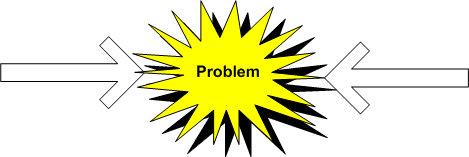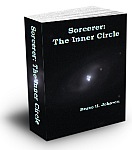<—previous in series next in series -->
What is storytelling?
We’re talking fiction here, it’s made-up stuff not anecdotes. A story is the description of a quest, a search for something, and the problems the characters run into on the way. There’s usually a McGuffin near the beginning, but it's not usually the ending goal or target. There’s got to be someplace for the characters to be, do or have.
While the final quest object may not be known to the characters near the start of the story, you as the writer sure have to know what it is. If neither you nor the characters know or have a quest, you’ve got a “literary” work of character changes – you’ve got Tolstoy’s Poe's The Telltale Heart. I’ll assume you’re interested in storytelling, not “literature.”
(17 May 2010) Most of the "technical" stuff here comes from L. Ron Hubbard's writings. See What is the FSU?
Games
A game has to contain:
- Freedoms
- Barriers
- Purpose(s)
- Choice & willingness to play.
If you’re missing any one of these elements, you don’t have a game and you don’t really have a story. The freedoms, barriers and purpose might only be partially known to the characters (you’d better know them) but as long as they have the choice and willingness to play, you can have a story.
The U.S. Internal Revenue service is not really a game. A U.S. citizen doesn’t really have a choice whether or not to play. If you make any income, you’re involved. Sure, you can drop out of society and live in the underground, but that’s not much of a game, is it? The IRS is actually one of the barriers in the game of life. How you handle it could be a game.
To us spirits, any game is better than no game. Even a rotten game is better than no game; we’ll even create a rotten game so we can have one.
Freedoms
You determine what freedoms the characters have. A lot of these are implicit in the StoryWorld (Ingermanson, et. al.) you create but might not be clear to the reader. A freedom might be the ability to move geographically. A barrier might be the requirement to have passports, visa, or other paperwork to move very far. Inside the US, that’s not an issue, but once you get outside it, there’s lots of barriers.
Barriers
These are the problems or conflicts the characters face while going towards their goals/purposes. A problem is stuck intention vs. counter-intention.
Intention: Get some food in the house.
Counter-intention: Oops, have no money in my pockets.
As long as both of these intentions are at the same strength and in opposite direction, you’ve got a problem or conflict. You might dig down in one of your stashes and bring out that $20 you hid a way for a rainy day – there goes the counter-intention.
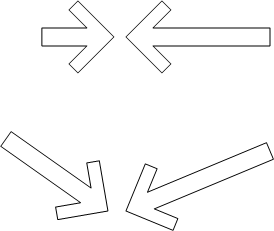
No problem; unequal strength or not directly opposed.
Flows
Flows show or determine the direction of the intentions involved.

Flow 0
Flow Zero is self-to-self. Angst, self-doubt, inner and outer intentions. Most protagonists need to have several of these to clean up along the way.
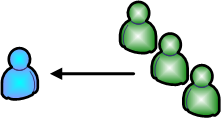
Flow one
Flow one is another or others to self. To create a problem, the protagonist needs to resist or counter-intend that action.
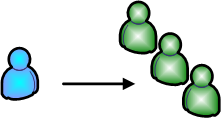
Flow 2
Flow 2 is self to another or others. If they are resisting, you've got a problem.
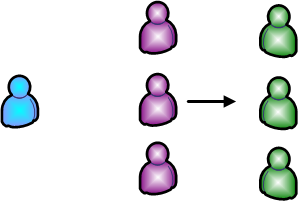
Flow Three
Flow three is external. What might cause a problem for the protagonist could be a desire for peace, or the problem the others are having is similar enough to one of his Flow Zero problems to keep it in mind.
Note the "others" could be anything, not just another person or persons. They could be Nature (hurricane, storm or earthquake), mechanical (Killer Robots from Pluto), animals (King's Cujo) or anything else you could think up. While a non-human might not have an actual "intention", the net result could well be a problem.
The other party doesn't even need to be antagonistic towards the protagonist, either. The klutzy kid brother could be constantly creating problems even though they aren't intentional. Maybe the story could involve his growing out of that klutziness.
You can and should have various problems pop up to be conquered. While a problem might not be completely solved at any one time, the magnitude could drop significantly. Of course, another problem of another type will probably appear almost immediately.
Interestingly enough, we often hold both the intention and counter-intention in place so we’ll have a barrier. No barrier, no game. That might be a really stupid idea, but we do it.
If your character runs into a problem, he can:
- Attack (confront and handle) it
- Attempt to flee from it
- Attempt to avoid it
- Attempt to neglect/ignore it
- Give in to it
Think of a hungry lion appearing in your living room. What would you do or not do?
If you don't have problems in your plot, you don't have a story. You've got a literary work.
Purposes
These are goals. They can be desired states of being such as getting a high school or college degree. They can be physical such as getting a car, the lost diamond of the High Sierras, or what have you. Again, without a decent goal, you’ve got a literary work.
What does this have to do with us Tech Writers?
We’re always in a game. Especially if you are a freelancer, you will have lots of different games. Example: Get the release notes for the latest software revision out to the users. The game:
Freedom – you can use pretty much any method of production. PDF, online webhelp, .chm, Word or Frame documents. Part of your freedom might be deciding how much information to include. You’re usually free to arrange it pretty much any way you wish.
Barriers – time deadlines. Company style guides. Changing user base. Limited access to the programmers to get the information. Previous methods (“We’ve always done it this way.”)
Purpose – get the new information to the users so they know how it affects them.
So we tech writers are intimately familiar with games. Fiction writing involves games from the very first word you write.
Happiness
Since we spirits need to have a game, we have a definition of happiness: overcoming not-unknown barriers towards not-unknown goals.
Assignment
Dig out your favorite novella or novel. Picking out the main protagonist, list out the barriers, freedoms and purposes. Start from the big to the small: what was the purpose or goal of the entire novel? What freedoms and barriers did the protagonist need to overcome to get there?
Were there any sub-games? If the protagonist didn’t know the final goal when the story starts, he’ll have something in mind. That something is the first sub-game: list out the freedoms, barriers and purpose. Do the same for the other sub-games you find.
